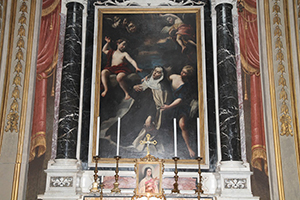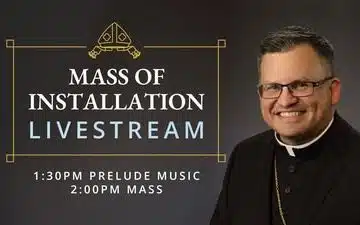Pope Francis: Four new saints point to humility – not worldly power

By Elise Harris CNA/EWTN News
On Sunday Pope Francis canonized four new saints, whose greatest legacy he said was their tireless imitation of Jesus in humble service to others, which is something each of us are asked to emulate.
“The men and women canonized today unfailingly served their brothers and sisters with outstanding humility and charity, in imitation of the divine Master,” the Pope said Oct. 18.
“The radiant witness of these new saints inspires us to persevere in joyful service to our brothers and sisters, trusting in the help of God and the maternal protection of Mary,” he told pilgrims gathered in St. Peter’s Square for the Mass.
Among the four newly canonized individuals recognized for their exemplary virtue are Italian priest Fr. Vincent Grossi, Sister Mary of the Immaculate Conception, and married couple Louis and Zelie Martin.
Known for being the parents of the 19th century French saint Therese of Lisieux, Saints Louis and Zelie Martin are the first married couple to ever be canonized together.
Pope Francis praised the couples’ humble attitude toward others, which is evident in the way that they practiced service within the family, “creating day by day an environment of faith and love which nurtured the vocations of their daughters, among whom was Saint Therese of the Child Jesus.”
He also pointed to Italian saint Vincent Grossi’s great zeal in attending to the needs of his flock, particularly the youth, as well as 20th century St. Mary of the Immaculate Conception’s extraordinary humility in serving the less fortunate, especially the children of the poor and sick.
In his homily Francis focused on the day’s first reading from Isaiah, in which the prophet depicts the image of the Servant of the Lord, who despite coming from a prestigious lineage, is “despised, shunned by all, a man of sorrows.”
“He does not do great things or make memorable speeches; instead, he fulfills God’s plan through his humble, quiet presence and his suffering,” the Pope said.
Because his mission is carried out in suffering, “this enables him to understand those who suffer, to shoulder the guilt of others and to make atonement for it.”
Jesus is the Servant of the Lord Isaiah was referencing, Francis explained, noting that it is thanks to his life and death, “marked by an attitude of utter service,” that we have been saved and reconciled with God.
Pope Francis then turned to the Gospel reading from Mark, in which the disciples James and John are urged by their mother to ask Jesus to sit in places of honor at his right and left in God’s Kingdom, following their own hierarchal vision of what it would be like.
“Their horizon was still clouded by illusions of earthly fulfillment,” he said, explaining that Jesus gives their worldly notions a “jolt” by speaking of his own earthly journey.
In telling the disciples that “the cup that I drink you will drink…but to sit at my right hand or at my left is not mine to grant,” Jesus assures them that they can share in his mission of suffering, but didn’t promise the honor they were looking for, the Pope said.
“His response is to invite them to follow him along the path of love and service, and to reject the worldly temptation of seeking the first place and commanding others.”
What Jesus’ words in the Gospel tell us is that service is the way authority is exercised in the Christian community, he said, adding that “those who serve others and lack real prestige exercise genuine authority in the Church.”
After giving the disciples a model of what not to do, Jesus then points to himself as the example to follow, the Pope noted. He said that it is by imitating Jesus that the community gets a new outlook on life.
In coming “not to be served but to serve, and to give his life as a ransom for many,” Jesus shows us that “he enjoys dominion because he is a servant, glory because he is capable of abasement, kingship because he is fully prepared to lay down his life.”
“By his passion and death, he takes the lowest place, attains the heights of grandeur in service, and bestows this upon his Church.”
Francis said that there is “no compatibility” between the worldly understanding of power and the humble service which characterizes true authority to Jesus’ own teaching and example.
“Ambition and careerism are incompatible with Christian discipleship; honor, success, fame and worldly triumphs are incompatible with the logic of Christ crucified,” he said. “Instead, compatibility exists between Jesus, the man of sorrows, and our suffering.”
Jesus, the Pope continued, knows our struggles firsthand thanks to his incarnation, and exercises his priesthood with mercy and compassion.
“The fact that he is without sin does not prevent him from understanding sinners,” he said, adding that the Lord’s glory doesn’t come from “ambition or the thirst for power.”
Rather, his glory is that of someone “who loves men and women, who accepts them and shares in their weakness, who offers them the grace which heals and restores, and accompanies them with infinite tenderness amid their tribulations.”
Each of us through baptism are called to share in Christ’s mission, receiving the charity that flows from his heart and passing it on to others, he said.
We then become “channels of his love and compassion, especially for those who are suffering, discouraged and alone.”
Pope Francis closed his homily by praising the example of the new saints, and praying that from heaven, “may they now watch over us and sustain us by their powerful intercession.”
Posted Oct. 19, 2015













